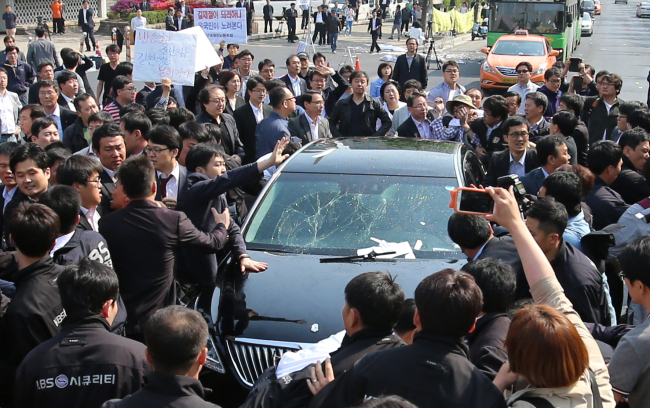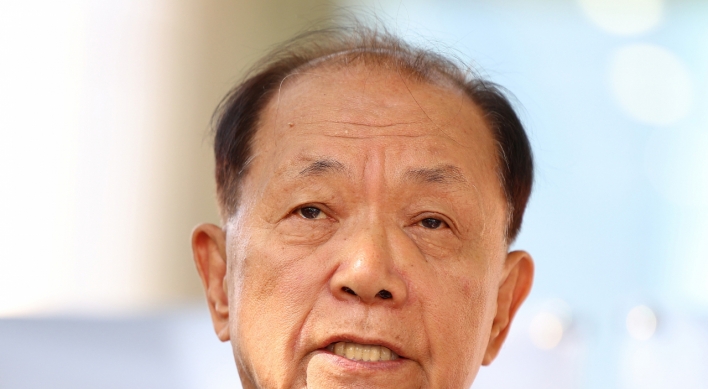KBS staff strike as chief refuses to quit
President of broadcaster accused of yielding to government meddling
By Claire LeePublished : May 19, 2014 - 21:15
KBS reporters launched their strike on Monday demanding the resignation of company president Gil Hwan-young for his alleged involvement in the presidential office’s apparent censorship of the state-run broadcaster.
The announcement came after Gil, who has been asked to step down, said on Monday that he would not resign.
“The strike will go on indefinitely starting at 6 p.m., as Gil said he is not resigning,” Song Seung-ryong, chairman of the National Association of KBS Journalists, said Monday. “Every member of our association ― some 200 of us ― as well as some 100 cameramen are participating.”
The announcement came after Gil, who has been asked to step down, said on Monday that he would not resign.
“The strike will go on indefinitely starting at 6 p.m., as Gil said he is not resigning,” Song Seung-ryong, chairman of the National Association of KBS Journalists, said Monday. “Every member of our association ― some 200 of us ― as well as some 100 cameramen are participating.”

The calls for Gil’s resignation came after Kim Si-gon, former chief of KBS’ news bureau, revealed that Gil acquiesced to Cheong Wa Dae’s pressure to produce newscasts favorable to the current administration, especially in coverage of the Sewol ferry disaster.
Kim, who stepped down from his KBS position on May 9 over a controversial remark regarding the victims of the ferry sinking, said he was ordered by Gil to refrain from criticizing the Coast Guard and its efforts in rescuing Sewol passengers. The sinking, one of the deadliest maritime disasters in the country’s history, left more than 300 dead or missing.
“We are talking about two things here,” Song from the National Association of KBS Journalists told The Korea Herald. “One is that Gil is responsible for violating the freedom of the press. The second is that there should be a systemic measure to protect the independence of KBS and (its journalism).”
According to the KBS Journalists’ Association, a representative body of the Seoul-based KBS reporters, Gil was involved in the programming of the broadcaster’s primetime evening news four times from May 1 to 8.
On one occasion, Gil told producers on May 3 to not broadcast a headline in which main opposition leader Ahn Cheol-soo asked President Park Geun-hye to publicly apologize to the victims of Sewol ferry disaster.
On Monday morning, Gil was blocked by some 200 members of KBS labor unions from entering the station’s building. He had been scheduled to have a discussion session with employees at 10 a.m. and a press conference at 3 p.m., but both were canceled. Gil and KBS reporters later organized a separate meeting for 5:30 p.m., where Gil said he would not step down.
“I used to be a TV producer, not a reporter,” Gil reportedly said during the meeting with KBS reporters. “I don’t know much about how newscasts work. Kim Si-gon used to send me the lineup of each day’s newscast at about 5 p.m., and I would ask him questions about it. I would ask questions such as ‘is today’s weather story worth being the top story?’ And I would offer my ideas and thoughts. I didn’t think what I did would be interpreted (as violation of freedom of press).”
In regards to how the strike would affect viewership, Song from the National Association of KBS Journalists said it is unlikely that they will see a blank screen when they turn on the TV. “But I assume the newscast will consist of what has already been produced,” he said.
By Claire Lee (dyc@heraldcorp.com)







![[KH Explains] No more 'Michael' at Kakao Games](http://res.heraldm.com/phpwas/restmb_idxmake.php?idx=644&simg=/content/image/2024/04/28/20240428050183_0.jpg&u=20240428180321)










![[Herald Interview] Mistakes turn into blessings in street performance, director says](http://res.heraldm.com/phpwas/restmb_idxmake.php?idx=652&simg=/content/image/2024/04/28/20240428050150_0.jpg&u=20240428174656)
